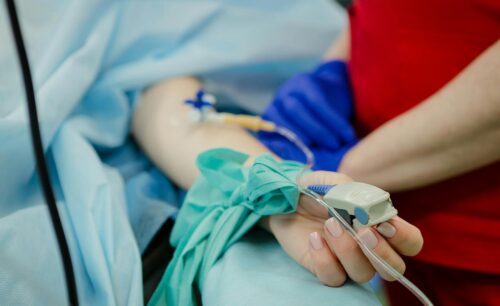Control, order, ego, modesty is left at the doorway to the emergency room. Your body, mind and spirit are fragmented, separated by fear, uncertainty, and dread. The line between life and death is a narrow one. You do not get to choose which path you go down, because it is already pre-ordained.
You hear sounds in the distance, but they are not distinct. A child softly sobbing, attached to her mother’s breast, an elderly woman hunched over with her face in her hands, a young adult with his arm elevated and pierced with a metal spear.
You look around the packed room, but you cannot make sense of what you see, feel, or hear. The room begins to enlarge and suddenly, it is if you are a spectator watching from above, certainly not a patient.

But as the nurse called my name and put my ID bracelet on, I knew I had crossed over to the other side of the bedside.
I was no longer the Director of Philanthropy, checking on her donors, meeting one of the physicians to discuss their grateful patients. I had officially become a patient of Providence Mission Hospital and I was going to experience what patients experience every day when they walk in through those doors.
Once I got into a room, things happened quickly, and when the gurney and the ED doctor appeared at the doorway, I knew something was terribly wrong. Many times, in life, we are faced with split second decisions that can alter our course and our outcome. In this moment, I choose faith and trust in my caregivers, that they were going to provide me with loving compassionate care. They never disappointed from the moment I walked into the ED until they wheeled me out.
After the surgery, I woke up in complete darkness. Was I dead? I looked around the room and saw a very bright light. I heard my mind say, God is that you? You look like Brad Pitt. Am I going to heaven? He replied back, are you kidding, I don’t have enough angels up here to take care of you.
I did something else! I decided to capture the caregivers in all their glory, so that I, one day, could help tell their stories in the hopes that my colleagues in fundraising could understand the motivations behind their decisions to become caregivers. I also asked them to share with me why they always came back even on the hardest days,
when patients expired, staffing was short, and families were less than grateful. Their answers varied, but across the board, they were all saying the same thing: it brought them profound joy to care for others who could not care for themselves,
and it was meaningful for them as a healthcare provider to help their patients and families heal.

One physician shared with me that helping ill patients, was like trying to solve a jigsaw puzzle; you are handed pieces of the puzzle and the work is to try and figure out how the pieces all fit together. This is the curious scientist in them, the oath they
take when they graduate from medical school. I witnessed firsthand how they put the puzzle pieces together to help resolve my medical emergency.
I have witnessed the healing power of gratitude in my patients as a nurse but did not truly understand this linkage between gratitude expressed and its transformation in a patient’s healing journey. That is, until now.

